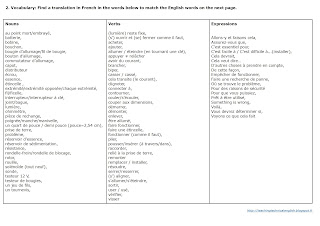Students synthesise everything they know about superheroes (and heroes) in order to analyse superhero stories, and practice their speaking, listening, and writing skills.
The main objective of these activities is to get students to talk about a familiar topic, as well as to understand the pattern behind superhero stories. The final task of this chapter will be to get the students to create their own superhero and present it to the class.
Students have made some diggings on superheroes through the Superheroes web quest (click here to read the post and access the worksheets). In teams, they have had to write questions on one superhero of their choice and then play a board game with questions from all teams. This activity gave common grounds to all of them to start analysing superhero stories.
In Analysing Superheroes worksheet (you will find the link at the bottom of this page), the key question is: "what makes a superhero?". So in exercise 1, we analyse different aspects of superhero stories to try and outline a pattern: how they became superheroes, what is their purpose, how they achieve their purpose and what type of characters we usually find in superhero stories.
Exercise 2 focuses on how different superheroes and heroes are. We listen to a video ( the link in which young people give their definition of a hero. Ultimately I ask them to come up with their own personal definition that starts up with "a hero is someone who...".
Finally, in exercise 3 students are expected to think about the differences between superhero stories and the real life. How crime is dealt with in superhero stories as opposed to the real life for example.
Eventually, I wanted to make them reflect upon the black and white vision of the world in superhero stories but it turned out to be a little ambitious (especially in the time lapse that we had). I was happy that they all came up with convincing reasons as for why people like superhero stories so much (exercise 4).
The activity worksheet is followed by a proposal of answers for each exercise.
Here is the worksheet (with answers on the second page)
Analysing Superheroes
This activity was preceded by a web search and board game creation
Superhero web quest
And it is followed by activities on comics covers (namely Captain America) and their link to major historical events:
Superheroes and History (the Example of Captain America): Reading, Writing and Speaking Activities
Cécile Sohier
Students have made some diggings on superheroes through the Superheroes web quest (click here to read the post and access the worksheets). In teams, they have had to write questions on one superhero of their choice and then play a board game with questions from all teams. This activity gave common grounds to all of them to start analysing superhero stories.
In Analysing Superheroes worksheet (you will find the link at the bottom of this page), the key question is: "what makes a superhero?". So in exercise 1, we analyse different aspects of superhero stories to try and outline a pattern: how they became superheroes, what is their purpose, how they achieve their purpose and what type of characters we usually find in superhero stories.
Exercise 2 focuses on how different superheroes and heroes are. We listen to a video ( the link in which young people give their definition of a hero. Ultimately I ask them to come up with their own personal definition that starts up with "a hero is someone who...".
Finally, in exercise 3 students are expected to think about the differences between superhero stories and the real life. How crime is dealt with in superhero stories as opposed to the real life for example.
Eventually, I wanted to make them reflect upon the black and white vision of the world in superhero stories but it turned out to be a little ambitious (especially in the time lapse that we had). I was happy that they all came up with convincing reasons as for why people like superhero stories so much (exercise 4).
The activity worksheet is followed by a proposal of answers for each exercise.
Here is the worksheet (with answers on the second page)
Analysing Superheroes
This activity was preceded by a web search and board game creation
Superhero web quest
And it is followed by activities on comics covers (namely Captain America) and their link to major historical events:
Superheroes and History (the Example of Captain America): Reading, Writing and Speaking Activities
Cécile Sohier



